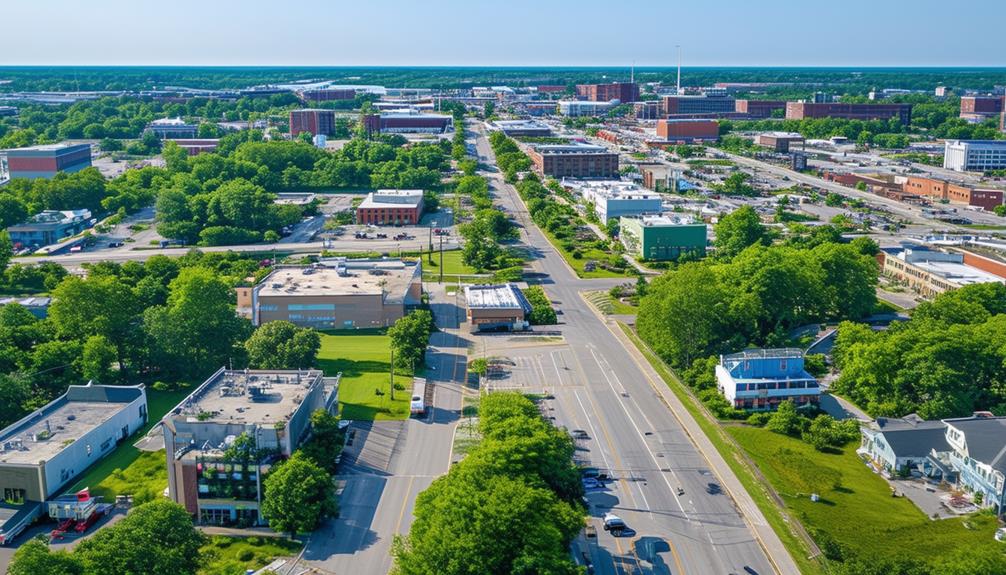Imagine a small state with big economic potential: expanding medical marijuana access in Delaware could be the key to unlocking this growth. This expansion could lead to job creation across agriculture, retail, and healthcare sectors, offering thousands of new opportunities. Tax revenue would likely surge, drawing parallels with successful models in states like Colorado and California. But it’s not just about jobs and taxes; healthcare cost savings and small business growth also come into play. How will these factors collectively shape Delaware’s future? The answer might surprise you.
Table of Contents
Job Creation

Expanding medical marijuana access in Delaware has the potential to create thousands of new jobs across various sectors. By fostering an economic stimulus, the initiative could significantly impact the labor market. Studies indicate that states with expanded medical marijuana programs have seen considerable job growth in agriculture, retail, and healthcare.
Delaware could follow a similar trajectory, creating employment opportunities for a diverse set of skills and qualifications. The cultivation and distribution of medical marijuana require labor-intensive processes which means the need for agricultural workers and botanists will rise. Additionally, dispensaries and retail outlets will create jobs for sales staff, security personnel, and administrative roles.
This expansion will also necessitate specialized healthcare professionals who can oversee patient care and provide essential services. Workforce development is another critical aspect. Training programs and certifications will need to be established offering you a chance to gain skills in a burgeoning industry.
Tax Revenue Increase
The expansion of medical marijuana access in Delaware could greatly boost state tax revenues, providing much-needed funds for public services and infrastructure. By leveraging the economic stimulation that comes with a burgeoning industry, Delaware can see significant increases in its tax base. States like Colorado and California have already demonstrated the potential for medical marijuana to generate millions in tax revenue. Delaware could follow suit, enhancing government budgets and allowing for improved public services.
Industry growth and market demand for medical marijuana are critical drivers of this tax revenue. The rising acceptance and use of medical marijuana mean a larger customer base and higher sales. As dispensaries and related businesses expand, they contribute to the economy through taxes on both sales and corporate earnings. This increased tax revenue can then be allocated to various public projects, from building schools to maintaining roads.
Moreover, the regulatory framework around medical marijuana ensures that the market remains organized and taxable. By monitoring transactions closely, the state can maximize its revenue intake. Expanding access not only meets medical needs but also provides a sustainable way to enhance Delaware’s fiscal health benefiting its residents.
Healthcare Cost Savings

Leveraging medical marijuana access in Delaware can lead to substantial healthcare cost savings by providing an alternative to more expensive pharmaceutical treatments. By integrating medical marijuana into treatment plans you could see a reduction in government spending and insurance coverage costs.
Studies indicate that patients using medical marijuana often experience improved patient outcomes particularly in pain management and chronic conditions, which can reduce the need for costly, long-term pharmaceutical prescriptions.
Furthermore, medical marijuana has the potential to lower opioid use. Data shows that states with medical marijuana programs have reported decreased opioid prescription rates. This decline not only promotes better patient outcomes by mitigating the risks associated with opioid addiction but also reduces the financial burden on the healthcare system.
Additionally, insurance companies may find that covering medical marijuana prescriptions is more cost-effective than traditional pharmaceuticals. You can expect this shift to result in lower premiums and out-of-pocket expenses for patients ultimately promoting more equitable access to essential healthcare services.
Small Business Growth
Implementing broader access to medical marijuana in Delaware could also stimulate small business growth by fostering a burgeoning market for dispensaries, cultivation centers, and ancillary services. This expansion offers significant entrepreneurial opportunities.
New businesses in these sectors can contribute to community development by creating jobs and supporting local economies. For instance, small-scale cultivators and local dispensaries can thrive providing diverse products and services tailored to the community’s needs.
Economic diversification is another critical benefit. By entering the medical marijuana market you’re not just limited to direct sales. Ancillary services like legal consulting marketing and security tailored for this industry offer additional business avenues. This diversification not only spreads economic risk but also fosters a more resilient local economy.
Market competition will naturally increase as more players enter the field. While this might seem challenging healthy competition can lead to innovation better quality products and more competitive pricing ultimately benefiting the consumer.
As a prospective entrepreneur you have the chance to be at the forefront of this market contributing to its growth and ensuring that it serves the community effectively.
Real Estate Impact

How will expanding medical marijuana access in Delaware impact the real estate market, especially concerning commercial property values and leasing rates?
The introduction of medical marijuana dispensaries and cultivation centers is likely to boost demand for commercial properties. This increased demand can push up property values particularly in zones where such businesses are allowed.
You need to take into account zoning regulations as these will have a significant impact on shaping the real estate landscape. Areas that ease zoning restrictions to accommodate medical marijuana facilities could experience a notable increase in leasing rates. Conversely regions with strict zoning regulations might see slower growth in property values due to limited business opportunities.
Data from states like Colorado and Oregon indicate a pattern where commercial property values have increased by 5-10% in areas permitting medical marijuana operations. This implies a similar result for Delaware assuming the state implements favorable zoning regulations.
Moreover, the rise in property values can have a positive impact on local tax revenues potentially supporting community services that benefit everyone.
Investment Opportunities
As commercial property values rise due to expanded medical marijuana access investors should closely monitor emerging opportunities in Delaware’s real estate market. Conduct a thorough market analysis to identify high-potential zones where dispensaries and cultivation facilities are likely to flourish. This can guide you in making informed decisions about property investments.
Consider the following investment opportunities:
- Commercial Real Estate: Acquire properties in strategic locations that could house dispensaries or cultivation centers. These properties are expected to appreciate in value as demand grows.
- Partnerships: Form investor partnerships to pool resources and mitigate risks. Collaborating with like-minded investors can provide the capital needed for larger, more lucrative projects.
- Ancillary Businesses: Invest in businesses that support the medical marijuana industry such as security services, packaging, and transportation. These sectors will benefit from industry growth without the regulatory complexities of direct marijuana sales.
- Technological Solutions: Invest in tech startups focused on enhancing the efficiency and security of medical marijuana operations such as inventory management systems and blockchain for tracking compliance.
Your investments can benefit patients and contribute to the community by ensuring safe reliable access to medical marijuana. Conducting a detailed market analysis and forming strategic investor partnerships will be essential in maximizing returns while serving others.
Tourism Boost

The expansion of medical marijuana access in Delaware is projected to significantly boost tourism attracting visitors interested in the state’s progressive health policies and cannabis offerings. A study by the Delaware Tourism Office indicates that states with expanded medical marijuana access see a 12-15% increase in tourism. This translates to more visitors exploring local attractions from scenic coastal areas to historic landmarks.
The hospitality sector stands to benefit notably. Hotels restaurants, and recreational facilities can expect increased patronage. For instance Colorado saw a 6% rise in hotel bookings following similar legislation. This data suggests a potential parallel in Delaware providing more employment opportunities and driving local economic growth.
Moreover, cannabis-related events such as educational seminars and wellness retreats can become new local attractions. These events not only draw tourists but also promote Delaware as a forward-thinking health-conscious state. By capitalizing on this trend you can help bolster the state’s reputation and support its economic resilience.
Regulatory Costs
Implementing expanded medical marijuana access in Delaware will result in significant regulatory expenses including those for compliance monitoring enforcement, and administrative overhead. As you assess the economic impact it’s vital to take into account the multifaceted nature of these regulatory costs.
You’ll need to address compliance challenges to make sure that all market participants adhere to industry standards. This involves robust systems for:
- Compliance monitoring: Ensuring that producers distributors, and retailers abide by state guidelines.
- Enforcement: Allocating resources to inspect facilities and penalize non-compliance.
- Administrative overhead: Processing applications issuing licenses, and maintaining records.
- Training and education: Equipping staff with the necessary knowledge to enforce regulations effectively.
Licensing fees will play an important role in offsetting some of these expenses. However setting these fees at the appropriate level is a delicate balance. Too high, and you risk stifling market competition; too low, and regulatory bodies may lack sufficient funds to enforce industry standards.
Public Health Benefits

While regulatory costs present a complex challenge one must also consider the significant public health benefits associated with expanding medical marijuana access in Delaware. Improved patient outcomes are a primary advantage. For conditions like chronic pain epilepsy, and multiple sclerosis, medical marijuana has shown efficacy where traditional treatments fall short.
By expanding access you can enhance community well-being by offering effective alternatives to opioids potentially reducing opioid-related morbidity and mortality.
Social equity is another vital element. Expanding access can help marginalized communities who disproportionately suffer from certain medical conditions. By reducing barriers to medical marijuana you address health disparities promote social equity, and make sure that all residents have equal access to effective treatments.
Moreover stigma reduction plays an important role. As more people become educated about the medicinal benefits of marijuana societal attitudes can shift. This shift not only fosters a more inclusive community but also encourages more patients to seek the care they need without fear of judgment.
Thus expanding medical marijuana access in Delaware isn’t just about individual patient outcomes it’s about fostering a healthier more equitable community overall.
Conclusion
Expanding medical marijuana access in Delaware isn’t just a possibility it’s a smart economic strategy. Think about it: Could the state afford to miss out on job creation increased tax revenue, and healthcare cost savings? By leveraging successful models from other states Delaware can boost small business growth real estate values, and even tourism.
The economic impact is clear and measurable making expansion a win-win for everyone involved.
Curious to learn more? Why not visit Cannabis Docs of Delaware to get all the details you need. We’re here to help you understand the benefits and answer any questions you might have. Feel free to give us a call at (855) 420-6797. We look forward to chatting with you!

